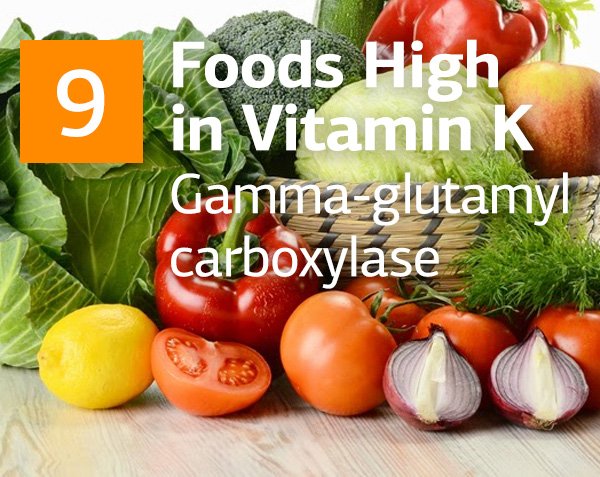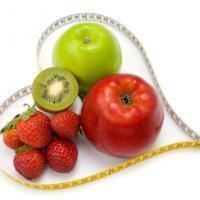Vitamin K and Top 9 Foods High in Vitamin K
Vitamin K is a fat-soluble nutrient, and its main function is providing normal blood clotting. It was even named after the German word Koagulation – clotting. Another name of vitamin K is menadione.
It is also responsible for bone formation, maintaining proper functioning of blood vessels and kidneys. Vitamin K affects the formation of blood clots and raises stability of vessel walls. It is a part of energy processes, formation of the body’s main energy sources and normalization of motor function and muscle activity. Studies have shown that vitamin K can prevent stomach, bladder, kidney, breast, ovary and colon cancer.
The daily requirement of vitamin K is 200-300mcg. The need for vitamin K increases for people with predisposition to external and internal bleedings or ill with hemophilia (disease that reduces blood clotting) and during pre-surgical preparations to reduce blood loss.
Vitamin K is a fat-soluble vitamin and therefore is absorbed in the intestines along with fats and bile.
Interaction Of Vitamin K With Other Nutrients
Vitamin K promotes absorption of calcium taking an active part in the formation of bones.
Among the factors that affect vitamin K content in products are food preservatives. They interfere with vitamin K absorption and may even contribute to its destruction.
Deficiency Of Vitamin K
The main symptom of vitamin K deficiency is slower blood clotting in both external and internal bleedings. It is usually caused by certain diseases or surgery. Vitamin K deficiency cannot be caused by nutritional factors, as this vitamin is widespread in all kinds of foods.
Dietary Toxicity Of Vitamin K
Consumption of large doses of vitamin K cannot lead to any side effects, that is why vitamin K toxicity level is not defined.
Foods High In Vitamin K
1. Spinach
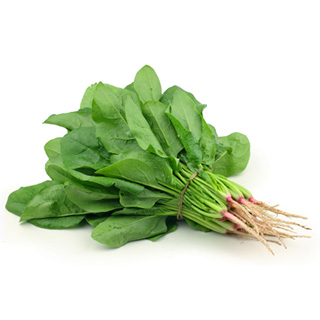
| Spinach | |
| 100 g | 1 bunch (340 g) |
| Vitamin K: 482.9 mcg (604% DV) |
Vitamin K: 1641.9 mcg (2052% DV) |
Spinach is the number one source of vitamin K. 100g of its leaves contains 480mcg of this nutrient. Spinach is also high in vitamins C, A, and vitamin B complex. It is also a famous supplier of iron. Spinach tasty leaves make a great base for any salad. Add some red and juicy tomatoes, fresh onions, olives and some lemon juice and you have a delicious and extremely healthy breakfast. It will not only wake your body up in the morning and give it a boost of energy, but will also supply it with vitamins needed for the whole day.
2. Lettuce
 Types of Lettuce Rich in Vitamin K (100g):
Types of Lettuce Rich in Vitamin K (100g):
| Lettuce, Red Leaf | |
| 100 g | 1 head (309 g) |
| Vitamin K: 140.3 mcg (175% DV) |
Vitamin K: 433.5 mcg (542% DV) |
The next great source of vitamin K is lettuce. 100g of it this yummy veggie supplies your body with 140mcg of the vitamin. It is also rich in folic acid, which normalizes metabolism and maintains nervous system and is an excellent source of vitamins A and C. Lettuce has a great nutritional value. The only vegetable that is higher in vitamins than lettuce is spinach. We are used to having it in the form of salads, but lettuce is as much appetizing in soup and in stir fry.
3. Broccoli
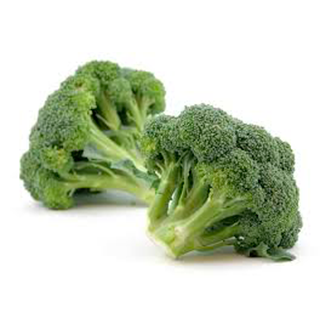
| Broccoli Raab | |
| 100 g | 1 stalk (19 g) |
| Vitamin K: 224 mcg (280% DV) |
Vitamin K: 42.6 mcg (53% DV) |
Broccoli contains fiber, phosphorus, calcium, magnesium, iron, zinc, and vitamins C, B1, B2, B5 and B6. 100g of this super healthy vegetable contains more than 200mcg of vitamin K. All the nutritional values allow broccoli to be a wonderful dietary product, which prevents and treats neurological disorders, intestinal tract diseases and metabolic disorders. Broccoli can be served raw, boiled, steamed and quickly fried. In addition, it is often used as an ingredient in soups, sauces for pasta, cakes, scrambles and vegetable side-dishes.
4. Cabbage
 Types of Cabbage Rich in Vitamin K (100g):
Types of Cabbage Rich in Vitamin K (100g):
| Cabbage | |
| 100 g | 1 head, medium (about 5-3/4 inch dia) (908 g) |
| Vitamin K: 76 mcg (95% DV) |
Vitamin K: 690.1 mcg (863% DV) |
Cabbage contains a wide variety of vitamins like K, C, E, and B group. To make up for the daily requirement of vitamin K an adult needs to eat 250g of raw cabbage. Its fiber beneficially affects gastrointestinal tract and reduces cholesterol level. As a dietary product cabbage is often recommended for weight loss. It is used for baking pies, in soups and salads, and can even be stuffed. I love cabbage with mushrooms. I think these two go together perfectly. Simply fry mushrooms with some olive oil and add a bit of cabbage. Then stew it for 20 minutes and you will have a delicious dish. Do not forget about salt and pepper.
5. Cucumber
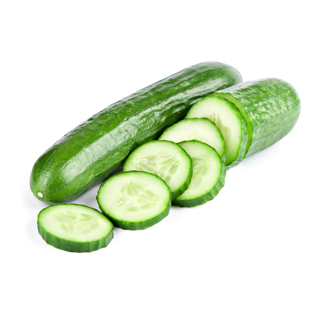
| Cucumber, With Peel | |
| 100 g | 1 cucumber (8-1/4 inch ) (301 g) |
| Vitamin K: 16.4 mcg (21% DV) |
Vitamin K: 49.4 mcg (62% DV) |
Cucumber is one of the greatest dietary products. It includes up to 95-98% of water, and therefore contains a small amount of calories. But the rest 2-5% are also very useful. They contain lots on nutrients including alkaline salts, which are able to slow aging process. 100g of cucumber includes more than 16mcg of vitamin K. Due to the low calorific value, cucumber is a perfect product for those who try to lose weight. These people should start their day with some refreshing cucumber juice. It will provide the body with water in its natural form and help to get rid of toxins and wastes.
6. Cauliflower

| Cauliflower, Green | |
| 100 g | 1 head, medium (5-6 inch dia) (431 g) |
| Vitamin K: 20.2 mcg (25% DV) |
Vitamin K: 87.1 mcg (109% DV) |
Rich in proteins, this cruciferous vegetable has a delicate structure and that is why is quite easily digested by the body. The cauliflower contains a huge amount of vitamins C, A and B complex. It is as high in vitamin K as cucumbers. Cauliflower is an invaluable source of iron (twice as good as green peas). In order to preserve most of the nutrients this vegetable can offer, you should bake it in the oven. Simply take the whole cauliflower, sprinkle it with olive oil with salt, black and red peppers and you can put it into the oven for 50 minutes. When the time is over, you will take out an exquisite and healthy meal.
7. Hot peppers
| Peppers, Hot Chili, Green | |
| 100 g | 1 pepper (45 g) |
| Vitamin K: 14.3 mcg (18% DV) |
Vitamin K: 6.4 mcg (8% DV) |
These vegetables contain large amount of oils, wax, vitamins B1, B2 and C. They are a little bit less high in vitamin K than cucumbers and cauliflower. Hot peppers contain capsaicin, which gives them that hot taste. Capsaicin can affect pain-sensitive nerve endings and in this way decrease pain. It helps to control weight as well. Sweet peppers also contain capsaicin, but its amount is 20 times lower. I think all these reasons are more than enough to convince you to spice up your diet. So, the next time when you are about to cook lunch, choose something Mexican like tacos or corn salsa. You can make your own less spicy version; just make sure you add the vitamin-rich hot pepper.
8. Carrots
 Types of Carrots Rich in Vitamin K (100g):
Types of Carrots Rich in Vitamin K (100g):
| Carrots | |
| 100 g | 1 medium (61 g) |
| Vitamin K: 13.2 mcg (17% DV) |
Vitamin K: 8.1 mcg (10% DV) |
Carrots contain vitamins B, C, E and K. 100g of these colorful veggies can provide your body with 13mcg of vitamin K. Carrots are also high in carotene, which is an enzyme that turns into vitamin A in the human body. Since vitamin A promotes growth, carrots are particularly needed by children. This vitamin is necessary for healthy vision and skin. Carrots, carrot dishes and especially carrot juice are used in clinical nutrition against vitamin A deficiency. The specific carrot flavor is provided by the essential oils, which are contained in these veggies. All the positive features of carrot can be extended with one more: eating it can never be bad for your health. No matter how much carrot you eat, there will be no side effects.
9. Tomatoes
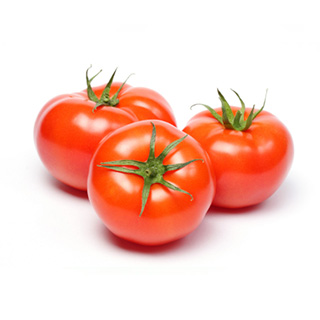 Types of Tomatoes Rich in Vitamin K (100g):
Types of Tomatoes Rich in Vitamin K (100g):
| Tomatoes, Green | |
| 100 g | 1 medium (123 g) |
| Vitamin K: 10.1 mcg (13% DV) |
Vitamin K: 12.4 mcg (16% DV) |
Tomatoes comprise sugar, mainly fructose and glucose and nutrients like calcium, iron and zinc. These vegetables are rich in vitamins A, C, E and vitamin B complex. 100g of fresh tomatoes can supply your body with almost 10mcg of vitamin K. But the best part is that tomatoes contain a powerful antioxidant - lycopene. It is a unique and natural remedy for many diseases. Unlike many vitamins, which are destroyed during food processing, lycopene can be concentrated in tomato juice, tomato paste or pizza sauce. So, the next time you doubt ordering pizza because it is not a very healthy food, order some extra sauce and help yourself!
